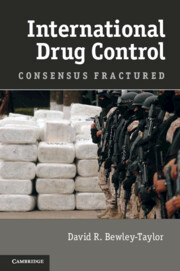Book contents
- Frontmatter
- Contents
- Figures and maps
- Tables and boxes
- Preface and acknowledgements
- Abbreviations
- 1 Introduction
- 2 Soft defection and the domestic normalization of harm reduction
- 3 Harm reduction at the UN: member state tension and systemic dissonance
- 4 Cannabis, soft defection and regime weakening
- 5 Defending the regime: the International Narcotics Control Board
- 6 Beyond regime weakening? Lessons from the UNGASS decade
- Index
- References
6 - Beyond regime weakening? Lessons from the UNGASS decade
Published online by Cambridge University Press: 05 December 2012
- Frontmatter
- Contents
- Figures and maps
- Tables and boxes
- Preface and acknowledgements
- Abbreviations
- 1 Introduction
- 2 Soft defection and the domestic normalization of harm reduction
- 3 Harm reduction at the UN: member state tension and systemic dissonance
- 4 Cannabis, soft defection and regime weakening
- 5 Defending the regime: the International Narcotics Control Board
- 6 Beyond regime weakening? Lessons from the UNGASS decade
- Index
- References
Summary
Laws evolve to reflect changes in the society that adopts them. International standards will evolve as the international community evolves, but time and effort must go into the process.
Daniel Dupras, Canada’s International Obligations Under the Leading International Conventions on the Control of Narcotic Drugs, 1998International regimes are not static constructs. Rather, they are dynamic social institutions that evolve over time according to the perceived needs and relative political capabilities of their members. Having thus far explored the processes of transformation and the changes taking place within the GDPR, this chapter shifts the study’s focus to examine debates and mechanisms relating to potential changes of the regime.
The year 2012 is a particularly fitting date to consider moves beyond the processes of regime weakening discussed so far. It marks the one-hundredth anniversary of the first fully-fledged multilateral agreement on drug control held in The Hague. Moreover, and more significantly in terms of the development of a US inspired and sustained global prohibitive norm, it should also be recalled that 2011 marked the fiftieth anniversary of the passage of the legislative bedrock of the modern regime: the Single Convention. The proximity of these significant anniversaries highlights not only its impressive longevity and resilience, but also simultaneously raises questions concerning the continuing relevance of the regime in its entirety for the contemporary era. Mindful of both its age and the increasing tensions within it, this chapter is premised on the belief that, as has been the case in a host of other issue areas, it is now appropriate to consider a process of modernization and the formal alteration of at least some aspects of the UN treaties on which the GDPR is based.
- Type
- Chapter
- Information
- International Drug ControlConsensus Fractured, pp. 279 - 336Publisher: Cambridge University PressPrint publication year: 2012
References
- 2
- Cited by

